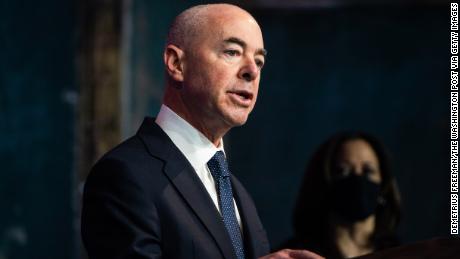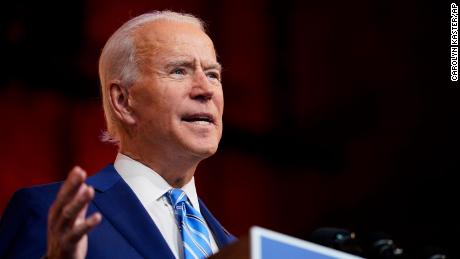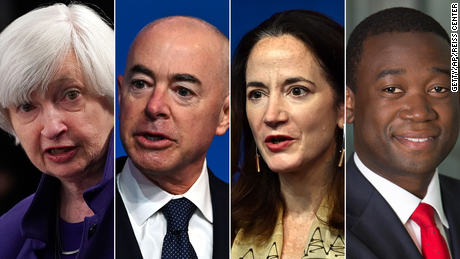(CNN)Alejandro Mayorkas has an enormous task before him if confirmed to lead the Department of Homeland Security -- but first, he faces Senate scrutiny, which could force him to again contend with some controversies from his past, including from his previous tenure at the department.
The Cuban-born Mayorkas, 61, was among President-elect Joe Biden's earliest announced nominees and would be the first Latino and immigrant to serve at the helm of the department.
He'll be expected to swiftly begin rolling back Trump administration immigration policies, while juggling response to a global pandemic, threats to the homeland, and restoring a department that's been rattled by leadership turnover and vacancies for the better part of the last four years.
Mayorkas is no stranger to the department, where he was known for connecting personally with staff. Under former President Barack Obama, Mayorkas served as both the DHS deputy secretary and the director of the US Citizenship and Immigration Services, an immigration agency within the department. Prior to joining the Department of Homeland Security, Mayorkas was also a US attorney in the Central District of California. Some of his actions while in those positions have recently resurfaced and could be a factor in his Senate confirmation hearing.
During his time at USCIS, for example, Mayorkas was accused of "giving special access and treatment" to wealthy foreign investors with ties to politically connected people, according to a watchdog report that cited concerns from more than a dozen employees.
The DHS inspector general was unable to determine Mayorkas' motives for his actions and found each of the decisions was "legitimately within his purview." He had wide discretion in overseeing the EB-5 visa program.
A transition spokesperson, who is handling questions for Mayorkas, told CNN that Mayorkas took steps to reform the visa program and "strengthen the quality and integrity of the process."'
One source who spoke with Mayorkas following his nomination said the former DHS deputy secretary was excited to serve in government again and was preparing for the confirmation process before the Senate. A former Homeland Security official also said Mayorkas is engaging with people he previously worked with and soliciting input.
The Biden-Harris transition team, meanwhile, has proceeded with meetings on a range of issues with career-level DHS officials. Acting Homeland Security Secretary Chad Wolf, who's faced increased scrutiny over his appointment and the controversial policies rolled out under his tenure, and Mayorkas spoke at the end of November, CNN has learned.
One of the first meetings between DHS and the transition team focused on "all things Covid," according to a DHS official. There is also a growing understanding that the incoming team -- which is stacked with volunteers with prior government experience -- doesn't need "101s" and they can move on to more policy-focused discussions.
Mayorkas has also been in touch with the transition and is receiving regular updates, according to the transition spokesperson.
But to execute on Biden's promises, Mayorkas first has to face the Senate and be confirmed.
Can Mayorkas' nomination clear the Senate?
The confirmation process is not unfamiliar to Mayorkas. He has been confirmed three times by the Senate, though no Republican voted for him in 2013 for his most recent role at the department.
He could face similar pushback from the GOP again. Republican Sen. Tom Cotton of Arkansas already expressed his opposition to Mayorkas, calling him "disqualified."
One of the primary concerns raised about Mayorkas stems from the watchdog investigation into his tenure as director of USCIS, the federal government office responsible for legal immigration, though he could also face questions about a commutation under former President Bill Clinton.
During his 2009 confirmation hearing for USCIS director, Mayorkas was questioned about a conversation he had as a US attorney with the Clinton White House regarding the commutation of Carlos Vignali. Vignali, who had his sentence commuted by Clinton in 2001, served six years of a 15-year prison term for conspiring to sell more than 800 pounds of cocaine.
Carlos' father, Horacio Vignali -- a politically connected, California businessman at the time -- asked Mayorkas to intervene on behalf of his son's clemency, according to a 2002 congressional report. The commutation was part of a series of controversial end-of-term clemencies issued by Clinton.
Biden Transition
Mayorkas told the Senate committee that it was a "mistake" to engage in the conversation with the White House, saying that his comments "were construed, and not unfairly so, to mean that my opinion leaned in favor of commutation." He was confirmed as USCIS director thereafter and served four years.
The Homeland Security inspector general report examining his time as USCIS director was released in 2015, after his confirmation to serve as deputy secretary, though he addressed the investigation's results during a House Homeland Security Committee hearing after its release.
Employees alleged that Mayorkas exerted influence to give individuals preference as part of a visa program, which gives residency preference to immigrants who agree to invest in the US economy and create jobs, according to the report, which stemmed from a whistleblower complaint.
The government watchdog found "a number of instances" where Mayorkas "declined to become involved in certain matters, stating that he did not think it would be appropriate for the Director to do so." But in three instances, the report said, Mayorkas communicated "outside of the normal adjudicatory process" and intervened in the decision-making process "in ways that benefited the stakeholders."
Among those who appeared to get special treatment, according to the report: investors funding a Las Vegas hotel and casino, following a request from then-Senate Majority Leader Harry Reid; an investor proposal to fund electric car manufacturing, with ties to Terry McAuliffe; and Anthony Rodham, brother of former Secretary of State Hillary Clinton.
Another accusation involved Time Warner Inc., according to the report. At the time, CNN's parent company Turner Broadcasting System was a unit of Time Warner.
Although the inspector general could not determine the motivation behind Mayorkas' actions, it said they caused "significant resentment" at the agency. Mayorkas said at the time the allegations that he provided preferential treatment and created an appearance of impropriety were "entirely unfounded."
In the wake of Biden naming Mayorkas, groups advocating for reduced immigration have cited the investigation, though some are withholding judgment until the nomination comes before the Senate.
"Right now, we have serious concerns because of the way he ran USCIS and because of some of the other things he's been involved in," said Chris Chmielenski, deputy director at NumbersUSA. "If he becomes the official nominee, officially presented before the Senate, and goes through the hearing process, we'll see how he views immigration."
Sen. Rob Portman of Ohio, who is in line to be the next chairman of the Homeland Security and Governmental Affairs Committee if the GOP retains the Senate after two upcoming runoffs in Georgia, said he's committing to a "fair process."
"As a former cabinet official I believe that every nominee deserves a fair process and I am committed to ensuring that happens at the Homeland Security and Governmental Affairs Committee," he said in a statement to CNN.
Democrats on the committee have praised Mayorkas, citing his private and public sector experience, as well as his having held senior level positions within DHS.
"Our nation faces persistent threats, both longstanding and new, including foreign and domestic terrorism, natural disasters, cyber-attacks, and now a pandemic," said Sen. Gary Peters of Michigan, ranking member of the Senate Homeland Security committee.
"The Department of Homeland Security plays a critical role in addressing these threats and strengthening our national security, and it needs highly qualified, experienced and dedicated leaders, like Mr. Mayorkas -- especially following years of chaos and mismanagement," Peters added.
Tackling changes to the US immigration system
While the Department of Homeland Security has a number of responsibilities, immigration is likely to remain among the top priorities, given Biden's promise to undo Trump's controversial policies, including dramatically curtailing who's eligible for asylum and requiring migrants to wait in Mexico until their immigration court date in the US.
Mayorkas built credibility among immigrant advocacy groups during the implementation of the Obama-era Deferred Action for Childhood Arrivals program, which shields undocumented immigrants who came to the US as children from deportation.
"(Mayorkas) held weekly meetings with a small brain trust that covered the range of key stakeholders in order to take into account the experiences of people on the ground, both structural barriers, the fears that the community might have and also thinking about how to mobilize," said Lorella Praeli, who at the time was director of policy and advocacy at United We Dream.
"He thinks about how you mobilize the workforce in order to make the policy real," she added. "He has tremendous challenges and with challenges, an opportunity to really turn it around."
Mayorkas' time at USCIS and as deputy secretary also resonated with staff. When he became the agency director, he "met with every employee" at USCIS headquarters over the course of several weeks, said an agency employee, who recalled Mayorkas asking employees about themselves and for feedback.
"It drove his leadership team nuts," but it resonated with the staff, the employee said.
During a trip to California as deputy secretary to meet with stakeholders and the workforce, Mayorkas took his team to a small Cuban coffee shop in a strip mall, recalled Peter Boogaard, a former DHS spokesperson who was on the trip. It was a shop his father used to take him to.
"It was a reminder of him really understanding where he came from and that being a key part of the type of person and leader he wanted to be," Boogaard, who's currently serving as communications director at FWD.us, told CNN.
"It struck me as different than the way in which other folks have presented in those moments," he added.
Sean Savett, a transition spokesperson, told CNN that Mayorkas has been meeting with "groups across a wide spectrum that interact with the missions and employees of the department," adding: "He will be taking input from all in advance of his nomination."
Biden picked Mayorkas, Savett told CNN in a separate statement, "because he is one of the most knowledgeable homeland security experts in the country and an experienced leader who has been hailed by both Democrats and Republicans."
"We look forward to working in good faith with both parties in the Senate to ensure that he is in place on day one helping safeguard the American people, protecting us from critical threats, and working to fix our broken immigration system," he said.
Immigrant advocates have made clear that a Biden administration shouldn't default to the Obama-era immigration policies. The Biden-Harris transition team has held several meetings with immigrant advocacy groups, who have had a front row seat to the Trump administration's immigration policies, to get read in on their priorities and wants.
Those meetings are ongoing and have been the source of new ideas, as well. Ashley Feasley, director of policy at the United States Conference of Catholic Bishops, a refugee resettlement agency, said her organization is advocating with the Biden team to appoint a senior-level White House coordinator ŌĆŗto coordinate federal agencies and other stakeholders around rebuilding the US refugee admissions program, which has been decimated under Trump.
This week, meetings are scheduled with immigrant advocate groups and the transition team to discuss asylum and enforcement, according to a source familiar with the meeting. Listening sessions have been ongoing.
Advocates have so far expressed confidence Mayorkas will swiftly execute on Biden's immigration pledges.
"In him, we have someone who is both impacted by the immigration system but also has a history of partnership with the NGO community as critical to the process of the US," said Alida Garcia, vice president of advocacy at FWD.us.
Mayorkas has made clear that he intends to restore the US humanitarian posture. Speaking virtually at an American Business Immigration Coalition summit this month, Mayorkas celebrated immigrants, drawing on his own family history, and reflected on the state of the US immigration system.
"Today, our immigration system is badly broken and we all know it. The cost of that broken system is incalculably high. It represents a profound toll not only on families seeking to contribute to our nation and forge their own American dream, but on our economic prosperity and our moral authority as well," he said.
Correction: A previous version of this story misspelled Peter Boogaard's name.






